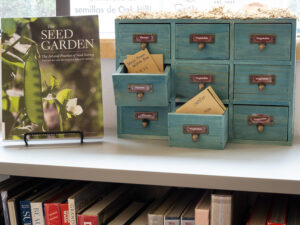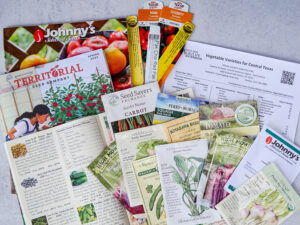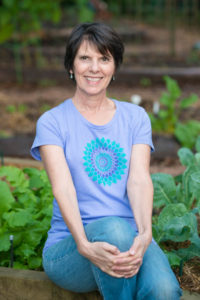Have you ever found yourself at a garden center, staring at a rack of seeds or a table full of transplants and wondering how to choose vegetable varieties for your garden? The many selections at nurseries and online can seem a bit overwhelming, and ending up with plants you don’t need can be costly. The following tips may help with the decision making.
Plan Before You Buy
Assess your garden situation, considering the space you have, the time you can devote to tending plants, as well as the time of year for planting (warm season or cool season). View the Travis County planting calendar for recommended planting dates: https://travis-tx.tamu.edu/files/2025/01/VegetableGardenPlantingGuide-Jan2025-English.pdf. The time of year makes a big difference on how to choose vegetable varieties that will thrive in the expected weather conditions.
Focus on Vegetables You Like to Eat
Make the most of your garden investment by choosing vegetables that appeal to you and those who will be cooking and eating the harvest. Consider varieties that are unique, hard to find or more expensive to buy at the grocery store such as orange cauliflower, yellow beans or fingerling potatoes. Take note of the expected harvest from the vegetables you plan to grow to determine how many plants you will need. One tomato seed will produce several tomatoes but one carrot seed will produce one carrot.
Review Gardening Resources
Start your search with reliable variety recommendations from Travis County AgriLife Extension (https://travis-tx.tamu.edu/files/2023/11/VegetableVarieties2023_English.pdf) and Texas A&M (https://aggie-hort.tamu.edu/publications/veg_variety/). Choose vegetable varieties that fit your soil and sun availability.
Shop Seed Sources

Some local libraries and community garden clubs offer a seed library or seasonal seed swaps that allow gardeners to trade and share seeds.
Shopping seed catalogs and garden websites is the best way to find specific varieties, whether an old favorite or a new release. Most seed companies allow you to sign up for informative newsletters about their latest offerings. Some provide insight into their work with vegetable breeders and trials before releasing new varieties. Texas based Willhite Seed is a 103-year-old, family-owned business; the varieties they offer are a good barometer of what is popular and dependable in Texas. Community seed swaps, garden club plant sales and seed libraries are also good sources of regional vegetable seeds and transplants. Travis County AgriLife Extension provides a list of reputable seed sources at the following link: https://travis-tx.tamu.edu/files/2021/12/VegetableSeedSources2021.pdf
Check Pricing and Quantity
Specialty hybrid and artisan seeds or varieties that have unusual colors, enhanced disease resistance or other special attributes command a premium price and a seed packet may only contain a small number of seeds. Be sure to check price and quantity before deciding which seed packets you want to add to your cart.
Read the Variety Description

Seed catalogs, university websites, seed packets and plant labels provide useful cultivation and harvest information for specific vegetable varieties.
Seed catalogs, plant tags and seed packets provide valuable information that can help with garden layout and timing. Knowing the days to harvest, mature size, spacing recommendations and disease resistance can help you choose varieties that will work for your particular situation. Some varieties are vining, some are bush, some are compact and some are sprawling. Make sure you match the mature size and growth habit to the space you have available.
Look for All-American Selections
Founded in 1932, All-America Selections (AAS) is an independent horticultural organization that coordinates trials of new flower and vegetable varieties in test plots and botanical gardens across the country in search of superior ornamentals and edibles for home gardeners. The winners receive an AAS designation that they display in retail centers and seed catalogs. Past AAS winners include long-time favorites such as ‘Clemson Spineless’ okra, ‘Juliet’ tomato and ‘Bright Lights’ Swiss chard.
Identify Hybrid and Open-Pollinated Seeds
Hybrid varieties are bred to combine desirable characteristics, such as disease resistance or improved yields, from two distinct parent plants. The seed is produced by man-made crosses and often the parent plants are known only to those involved in seed production. Saving seed from hybrids is not recommend because the results will not be consistent and may not display the desired traits. Open-pollinated seeds are described as true to type; they are stable varieties and will produce plants that are genetically identical to the parent plant. Open-pollinated seed can be collected and saved from year to year. Heirloom seeds are open-pollinated varieties that have been saved and passed on for more than 50 years.
Order Early
Trendy and new varieties go out of stock quickly. Other years there are crop failures which mean certain seeds won’t be replenished. Shopping early in the season provides the best selection. Even better, ordering early gives you time to find substitutes for varieties that aren’t available.
Track Results and Repeat!
Use a garden journal or calendar to help you choose vegetable varieties in coming years. Each of our gardens have unique micro-climates and it’s worth keeping track of what works. Run your own experiments by choosing one or two new varieties each garden season as challengers. If you have young children in your life, choose a weird-looking vegetable variety to help keep curious minds engaged. (This also works with spouses.)
Additional Resources
Watch the Vegetable Gardening in Central Texas Webinar
Vegetable Planting Calendar (Español, 繁体中文)
Recommended Vegetable Varieties for Travis County
Plant Rotations, Successions and Intercropping
Sustainable Food Center Farmers Markets
Monthly Gardening Calendar for Austin and Central Texas
About Patty Leander

This post was written by Patty G. Leander.

